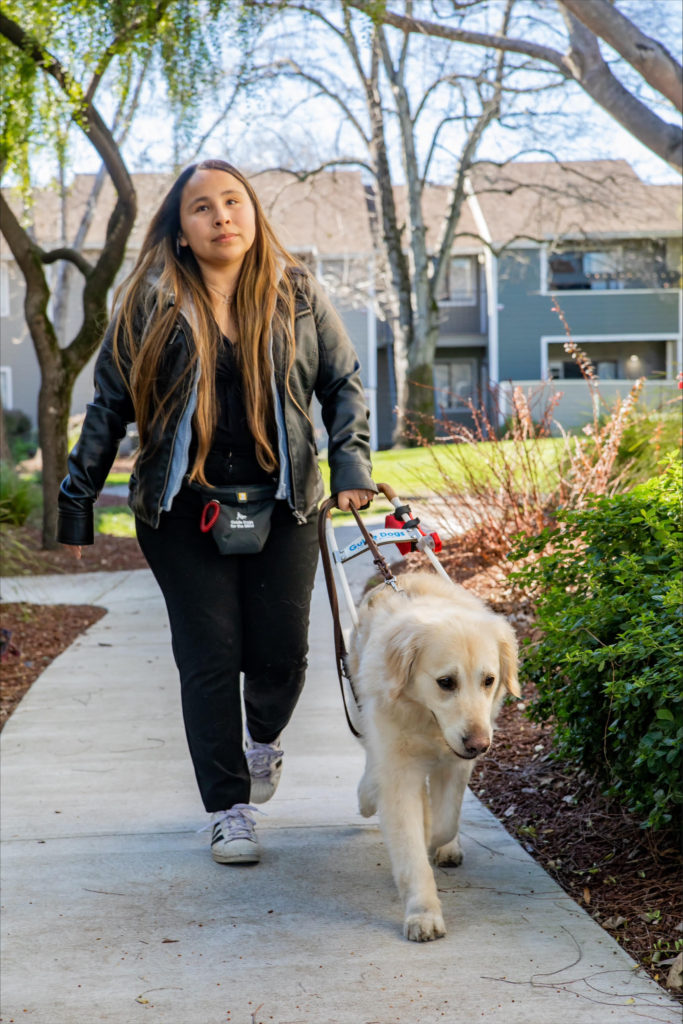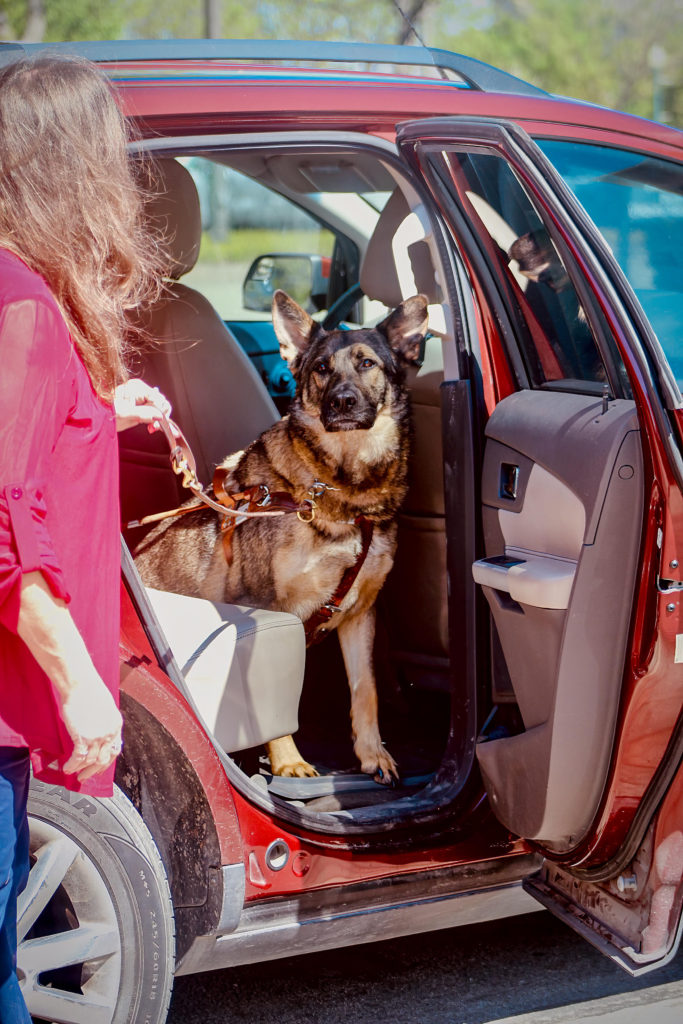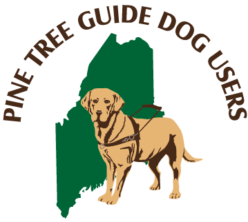Introduction
About Guide Dogs
Driver Refusals
The Impact of Rideshare Denials
Denial Statistics
Class-Action Settlement Agreements
Service Animal Policies
State and Federal Access Laws
Summary

Introduction
Nationwide, rideshare services offer an important means of reliable, affordable, and efficient transportation for a diverse range of people. These services are especially valuable for people with disabilities who cannot drive. But for many blind or low vision riders with guide dogs, access to these services is frequently denied by drivers who refuse to accept service animals in their vehicles.
About Guide Dogs
Guide dogs, like other types of service animals, are working animals, not pets. They undergo extensive training to help people with visual disabilities to move about safely and independently. Examples include commuting to work, running errands, going to an appointment, or just heading out for an evening with friends.
Driver Refusals
Despite clear guidelines in the contractual agreements and policies set forth by Transportation Network Companies (TNCs), periodic reminders and notifications about the driver’s obligation to transport service animals, and requirements under state and federal laws, some rideshare drivers still knowingly or mistakenly believe that they can deny access to riders with service animals. Common but unlawful excuses that drivers use to justify discriminatory conduct include:
- Concerns that the dog may leave hair, have an accident, or damage the vehicle
- Concerns that the dog may jump around or otherwise misbehave during transit
- Independent contractor classification allows them to deny transport to anyone they want
- Pet-friendly services like Uber Pet make them exempt from transporting service animals
- No advance notice about the presence of the service animal was provided by the rider
- Fear or dislike of dogs
- Religious or cultural objections
- Personal allergies or those of others who may later be in the vehicle
- Insufficient knowledge of service animal requirements
- Service animal was not wearing a vest or carrying documentation
- Vehicle is leased or borrowed so they cannot allow dogs
Help rideshare drivers learn more about guide dogs
and what to expect
when transporting these highly trained animals.
The Impact of Rideshare Denials
As a result of driver refusals, many riders have been left stranded in unfamiliar areas, thus compromising their safety. They may also be forced to wait for an extended period of time — sometimes in inclement weather. This can cause riders to miss or be late to work, school, medical appointments, flights, family obligations, social events, and more. In some instances, refusals result in extra charges or penalties for the rider such as additional cost for a missed flight or disciplinary action for arriving late to work.
Moreover, the constant threat of driver hostility and rejection often creates stress and anxiety among people with guide dogs. The uncertainty of reliable transportation also contributes to the rider’s apprehension. Some riders will attempt to avoid being late by factoring in additional time to allow for multiple refusals. Others will pay higher fees with longer wait times for pet-friendly rideshare services in an attempt to secure transportation and to avoid the humiliation of overt discrimination. For some, repeated refusals have significantly affected their ability and desire to go out unless they can find an alternative means of transportation. Others have been deterred from even attempting to use rideshare services because of the unreliability and the high risk of discrimination.

Denial Statistics
Current anecdotal evidence and other reports indicate rideshare denials continue to be a significant barrier for riders with guide dogs. To date, relatively few studies have investigated the actual number of rideshare denials or the psychological, social, and economic impact on these riders. Known studies conducted in the United States include:
The Seeing Eye 2023 Access Barriers Survey
Key findings revealed that approximately 80% of respondents had experienced at least one denial from rideshare drivers, of which 40% had experienced multiple denials.
Guide Dogs for the Blind 2023 Rideshare Survey
Key findings revealed over 83% of respondents had experienced denials from rideshare drivers, with many reporting multiple occurrences. The survey also explored how these refusals negatively impacted the respondent’s lifestyle.
American Council of the Blind 2023 Transportation Survey
Eighty respondents submitted detailed information about their experiences with rideshare denials. These results were compiled in one central document and submitted to the U.S. Department of Justice in January 2023 with a request to conduct a pattern of practice investigation.
National Federation of the Blind (NFB) 2018 Uber Compliance Report
During the NFB’s settlement agreement’s compliance monitoring period from February 16, 2017 through the end of December 2018, Uber reported receiving 11,295 rider complaints of denials due to service animals and 3,268 complaints related to other forms of discrimination related to service animals other than being denied a ride.
Check out the National Federation of the Blind’s Rideshare Rally to raise awareness about Uber and Lyft’s failure to stop discrimination against blind people.
Class-Action Settlement Agreements
In 2016, two nationwide class-action settlements resolved separate lawsuits against Uber and Lyft brought by the NFB. The terms of the agreements required both TNCs to implement additional policies and procedures to educate drivers and to ensure that drivers provided full and equal access to riders with service animals. Unfortunately, the provisions set forth in the agreements ultimately failed to markedly reduce incidents of discrimination. Today, The NFB continues to gather feedback through its online Rideshare Discrimination Survey as part of its ongoing efforts to resolve these incidents. Details about the settlements and the survey can be found at:
National Federation of the Blind of California, et al. v. Uber Technologies
National Federation of the Blind v. Lyft Inc.
NFB Rideshare Discrimination Survey
Service Animal Policies
Most, if not all TNCs have policies prohibiting drivers from denying service, charging improper cleaning fees, or otherwise discriminating against riders with service animals. These policies warn that drivers who knowingly engage in discriminatory conduct will be removed from the rideshare platform. Examples of company policies include:
State and Federal Access Laws
The Americans with Disabilities Act (ADA) is a federal civil rights law that prohibits discrimination against people with disabilities in everyday activities. Title III of this law covers the rights of people who use service animals, and among other protections, sets forth the requirements that private transportation services must follow.
Most service animals are dogs but under the U.S. Department of Transportation’s definition of a service animal, other types of animals may be used to mitigate a person’s disability.
State and local governments also provide protections against discrimination. Some of these laws may offer greater benefits than the ADA. For example, some laws may define the term “service animal” more broadly than the ADA. Some grant public access to disabled people with emotional support animals, and some include access to puppy raisers or trainers with service animals that are still in training. A few helpful resources include:
State laws About Service Animals
Summary
Over the past decade, TNCs have fundamentally shifted the way people use transportation services. Companies like Uber and Lyft have quickly outpaced traditional taxi systems, leaving blind and low vision people with few alternatives but to contend with discriminatory rideshare services that lack sufficient oversight and accountability.
It’s apparent that significant changes are needed before people with guide dogs can safely and reliably obtain the transportation they require to lead independent lives. However, the complex challenges of changing discriminatory attitudes towards riders with service animals requires a multifaceted approach to improved regulation, driver education, enforcement, and company policies.
